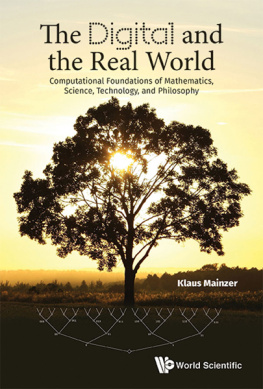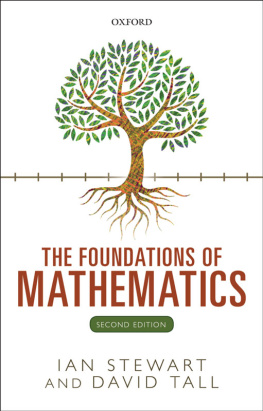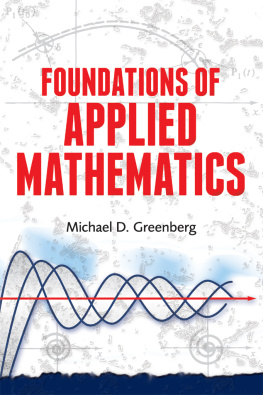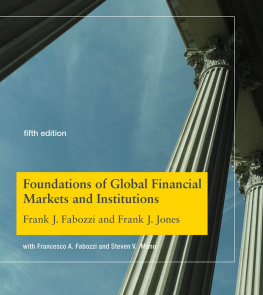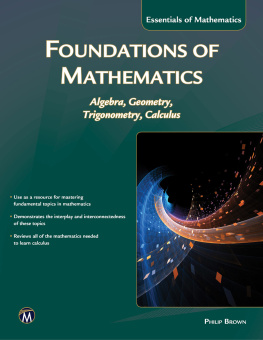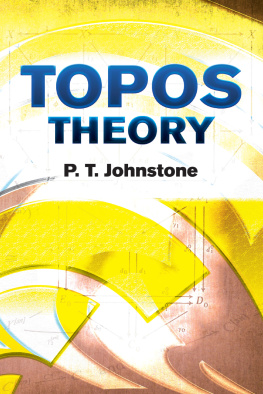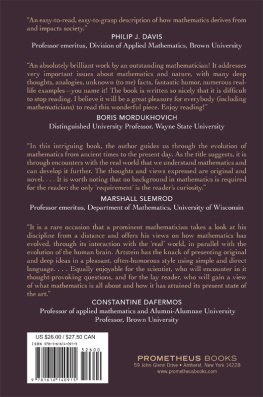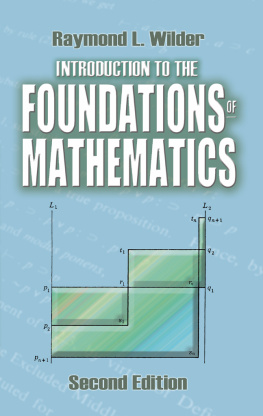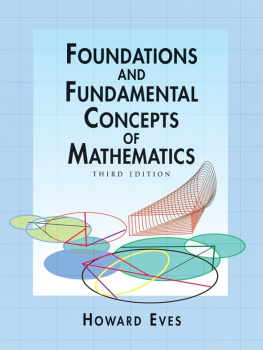Frank Plumpton Ramsey - Foundations of Mathematics and Other Logical Essays
Here you can read online Frank Plumpton Ramsey - Foundations of Mathematics and Other Logical Essays full text of the book (entire story) in english for free. Download pdf and epub, get meaning, cover and reviews about this ebook. year: 1931/2001, publisher: Routledge, genre: Science. Description of the work, (preface) as well as reviews are available. Best literature library LitArk.com created for fans of good reading and offers a wide selection of genres:
Romance novel
Science fiction
Adventure
Detective
Science
History
Home and family
Prose
Art
Politics
Computer
Non-fiction
Religion
Business
Children
Humor
Choose a favorite category and find really read worthwhile books. Enjoy immersion in the world of imagination, feel the emotions of the characters or learn something new for yourself, make an fascinating discovery.

- Book:Foundations of Mathematics and Other Logical Essays
- Author:
- Publisher:Routledge
- Genre:
- Year:1931/2001
- Rating:4 / 5
- Favourites:Add to favourites
- Your mark:
- 80
- 1
- 2
- 3
- 4
- 5
Foundations of Mathematics and Other Logical Essays: summary, description and annotation
We offer to read an annotation, description, summary or preface (depends on what the author of the book "Foundations of Mathematics and Other Logical Essays" wrote himself). If you haven't found the necessary information about the book — write in the comments, we will try to find it.
Foundations of Mathematics and Other Logical Essays — read online for free the complete book (whole text) full work
Below is the text of the book, divided by pages. System saving the place of the last page read, allows you to conveniently read the book "Foundations of Mathematics and Other Logical Essays" online for free, without having to search again every time where you left off. Put a bookmark, and you can go to the page where you finished reading at any time.
Font size:
Interval:
Bookmark:

The International Library of Philosophy
PHILOSOPHY OF LOGIC AND MATHEMATICS
In 8 Volumes
| I | The Nature of Mathematics | Black |
| II | The Technique of Controversy | Bogoslovsky |
| III | The Limits of Science | Chwistek |
| IV | Foundations of Geometry and Induction | Nicod |
| V | The Foundations of Mathematics | Braithwaite |
| VI | Logical Studies | von Wright |
| VII | A Treatise on Induction and Probability | von Wright |
| VIII | An Examination of Logical Positivism | Weinberg |

First published in 1931 by
Routledge
Reprinted in 2000, 2001 (twice) by
Routledge
2 Park Square, Milton Park, Abingdon, Oxon, OX14 4RN
Transferred to Digital Printing 2006
Routledge is an imprint of the Taylor & Francis Group
1931 Editorial Selection and Introduction R. B. Braithwaite
All rights reserved. No part of this book may be reprinted or reproduced or utilized in any form or by any electronic, mechanical, or other means, now known or hereafter invented, including photocopying and recording, or in any information storage or retrieval system, without permission in writing from the publishers.
The publishers have made every effort to contact authors/copyright holders of the works reprinted in the International Library of Philosophy.
This has not been possible in every case, however, and we would welcome correspondence from those individuals/companies we have been unable to trace.
These reprints are taken from original copies of each book. In many cases the condition of these originals is not perfect. The publisher has gone to great lengths to ensure the quality of these reprints, but wishes to point out that certain characteristics of the original copies will, of necessity, be apparent in reprints thereof.
British Library Cataloguing in Publication Data
A CIP catalogue record for this book is available from the British Library
The Foundations of Mathematics
ISBN 0-415-22546-9
Philosophy of Logic and Mathematics: 8 Volumes
ISBN 0-415-22575-2
The International Library of Philosophy: 56 Volumes
ISBN 0-415-21803-9
ISBN10: 0-415-22546-9 (hbk)
ISBN10: 0-415-40852-0 (pbk)
ISBN13: 978-0-415-22546-5 (hbk)
ISBN13: 978-0-415-40852-3 (pbk)
eISBN: 978-1-134-52810-3
Published Papers
Unpublished Papers
T HE author of the papers collected in this volume seemed to me to combine very exceptional brilliance with very great soundness of judgment in philosophy. He was an extraordinarily clear thinker: no-one could avoid more easily than he the sort of confusions of thought to which even the best philosophers are liable, and he was capable of apprehending clearly, and observing consistently, the subtlest distinctions. He had, moreover, an exceptional power of drawing conclusions from a complicated set of facts: he could see what followed from them all taken together, or at least what might follow, in cases where others could draw no conclusions whatever. And, with all this, he produced the impression of also possessing the soundest common sense: his subtlety and ingenuity did not lead him, as it seems to have led some philosophers, to deny obvious facts. He had, moreover, so it seemed to me, an excellent sense of proportion: he could see which problems were the most fundamental, and it was these in which he was most interested and which he was most anxious to solve. For all these reasons, and perhaps for others as well, I almost always felt, with regard to any subject which we discussed, that he understood it much better than I did, and where (as was often the case) he failed to convince me, I generally thought the probability was that he was right and I wrong, and that my failure to agree with him was due to lack of mental power on my part.
Ramsey was not only exceptionally capable of thinking clearly himself; he also had a most uncommon power of explaining clearly to others what he thought and why he thought it. There are many good examples in this volume of his great capacity for lucid exposition. But sometimes I feel that he fails to explain things as clearly as he could have done, simply because he does not see that any explanation is needed: he does not realize that what to him seems perfectly clear and straightforward may to others, less gifted, offer many puzzles. I must confess that I personally often find a difficulty in understanding at all clearly what he means, in cases where he does not seem to have been aware than any difficulty whatever would be found. No doubt, in many of these cases, some readers will understand him without difficulty; but I suspect that many will be in my case. In the last two sections of the volume (the notes of 1928 and 1929), where he was writing chiefly for himself and not expanding and explaining as he would have done if writing for publication, the difficulty of following him with adequate comprehension is naturally specially great. But even where you cannot understand him completely you can often understand him enough to find him extraordinarily interesting; and I am convinced that it is well worth while to try to understand him. No doubt sometimes he may make mere mistakes; but in general I think he himself knew very well indeed what he was about, and, even if he was wrong, had very good reasons for the opinions at which he had arrived. It is a great misfortune that his early death prevented him from making these opinions, and the reasons for them, as clear as he, and perhaps he alone, could have made them.
G. E. MOORE.
December. 1930.
FRANK PLUMPTON RAMSEY was born on 22nd February, 1903, and died on 19th January, 1930. The son of the President of Magdalene, he spent nearly all his life in Cambridge, where he was successively Scholar of Trinity, Fellow of Kings, and Lecturer in Mathematics in the University. His death at the height of his powers deprives Cambridge of one of its intellectual glories and contemporary philosophy of one of its profoundest thinkers.
Though mathematical teaching was Ramseys profession, philosophy was his vocation. Reared on the logic of Principia Mathematica, he was early to see the importance of Dr. Wittgensteins work (in the translation of which he assisted); and his own published papers were largely based on this. But the previously unprinted essays and notes collected in this volume show him moving towards a kind of pragmatism, and the general treatise on logic upon which at various times he had been engaged was to have treated truth and knowledge as purely natural phenomena to be explained psychologically without recourse to distinctively logical relations. Ramseys philosophy, however, was always tentative and experimentalhis calmness in infanticide frequently amazed his friendsand the papers in this volume are published as important in themselves and as likely to lead to work on similar lines and not as the exposition of a consistent and complete philosophical system.
The subtlety and fertility of Ramseys philosophical work as shown here need no advertisement; but since his two papers on mathematical economics are not included, I have obtained Mr. J. M. Keynes permission to quote from his notice in
Font size:
Interval:
Bookmark:
Similar books «Foundations of Mathematics and Other Logical Essays»
Look at similar books to Foundations of Mathematics and Other Logical Essays. We have selected literature similar in name and meaning in the hope of providing readers with more options to find new, interesting, not yet read works.
Discussion, reviews of the book Foundations of Mathematics and Other Logical Essays and just readers' own opinions. Leave your comments, write what you think about the work, its meaning or the main characters. Specify what exactly you liked and what you didn't like, and why you think so.

